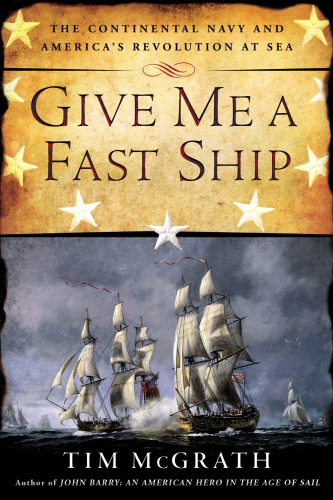
Give Me a Fast Ship
The Continental Navy and America's Revolution at Sea
کتاب های مرتبط
- اطلاعات
- نقد و بررسی
- دیدگاه کاربران
نقد و بررسی

May 26, 2014
McGrath (John Barry: An American Hero in the Age of Sail) enhances his position among American Revolution naval war historians with this comprehensive, fast-paced account of the collection of armed merchantmen (non-naval vessel) manned by amateurs that took on the world’s greatest naval power. America’s Continental Navy was seriously overmatched by the British, yet in the spring of 1776 a Yankee squadron took two British forts in the Bahamas, returned home laden with military stores, and supported the U.S. Marine Corps in its first amphibious landing. By 1777 “the naval war was being taken to George III’s backyard,” as a Continental squadron “sent the mighty British Empire into fits of temper and hand-wringing.” As the war progressed, small ships had better survival odds than the more glamorous frigates that drew British attention they could not match. McGrath’s vivid treatment of the Continental Navy’s teething troubles highlights the contributions of such lesser-known captains as Gustavus Conyngham, Jack Barry, and Joshua Barney, usually overshadowed by the spectacular achievements of John Paul Jones. He also addresses financial troubles, desertions, and mutinies of those early years. McGrath demonstrates that, despite the crises that threatened to marginalize the Continental Navy, its fighting spirit and outrageous optimism began a tradition that endures. Maps.

Starred review from June 15, 2014
Provincial sailors challenge an empire in this rousing account of the Continental Navy.In late 1775, the Continental Congress set out to assemble a modest navy to confront the British warships that had been shelling Colonial towns. After independence was declared, the navy's duties expanded to include escorting merchantmen and harassing British shipping. The project appeared nearly impossible-the British fleet was the world's most powerful-and the notion that it could be effectively opposed by a few hastily built or purchased ships appeared preposterous-all of which just makes this story the more stirring. McGrath (John Barry: An American Hero in the Age of Sail, 2010) delivers a lively history of the Continental Navy, from its birth at the urging of John Adams to the end of the war, replete with political and diplomatic intrigue, personal tragedies, shipwrecks, prison escapes and plenty of sea battles. John Paul Jones is here, of course, but the author also brings to the fore such lesser-known but equally audacious warriors as Gustavus Conyngham and John Barry. Throughout, the commanders battle not just the enemy, but the incompetence to be expected in a fledgling military service, as well as shortages of men, arms and money, often exacerbated by a dilatory and bankrupt Congress whose members were financing privateers competing with the navy for resources. With discouraging frequency, the new navy's ships were wrecked, sunk or captured to be used against the rebellious colonists, but the tiny fleet nevertheless provided critical assistance by supplying Washington's army with desperately needed munitions and supplies; the fleet also diverted British naval resources by carrying the war into European and Caribbean waters. McGrath puts readers at ease by unobtrusively explaining the technical aspects of naval warfare in the age of sail. His gripping descriptions of pursuit and combat at sea are the equal of any fiction, with the added virtue of being entirely true.Solidly researched history presented with verve and gusto.
COPYRIGHT(2014) Kirkus Reviews, ALL RIGHTS RESERVED.

























دیدگاه کاربران